The Power of Fruits in Weight Loss and Overall Health
Fruits have long been recognized as an essential component of a healthy diet. Not only are they packed with essential vitamins and minerals, but Best Fruits for Weight Loss also play a crucial role and overall health. In this section, we will explore the numerous benefits of fruits for weight loss, their importance in weight management, and how incorporating them into your daily diet can contribute to a healthier lifestyle.
When it comes to shedding those extra pounds, fruits are an excellent choice. They are low in calories while being high in fiber and water content. This combination helps to keep you feeling fuller for longer periods, reducing the likelihood of overeating or snacking on unhealthy foods. Additionally, the natural sugars found in fruits provide a healthier alternative to processed sugars commonly found in sugary snacks or desserts.
Furthermore, fruits are rich in vitamins, minerals, and antioxidants that support overall health and well-being. These nutrients help boost your immune system, promote healthy digestion, and provide essential fuel for optimal bodily functions.
In terms of weight management, incorporating a variety of fruits into your diet can be highly beneficial. Their high fiber content aids digestion and helps regulate blood sugar levels. This can prevent spikes in insulin levels that often lead to cravings for unhealthy foods.
The importance of fruit consumption cannot be overstated when it comes to maintaining good health. The wide range of nutrients found in various fruits contributes to improved cardiovascular health by reducing the risk of heart disease and stroke. Additionally, the antioxidants present in many fruits help protect against cell damage caused by free radicals.
Incorporating an assortment of fruits into your daily diet has numerous benefits for both weight loss efforts and overall health maintenance. The combination of low-calorie content with high fiber and water content makes them an ideal choice for those looking to shed pounds while staying nourished. Moreover, the abundance of vital nutrients found within different types of fruit supports various bodily functions necessary for optimal well-being. So why not make fruits a staple in your diet and reap the rewards of their power in weight loss and overall health?
Table of Contents
The Top 19 Best Fruits for Weight Loss
When it comes to weight loss, incorporating fruits into your diet can be a delicious and nutritious way to shed those extra pounds. In this section, we will explore the top 19 fruits that are known for their weight loss benefits.
Apples: Apples are low in calories and high in fiber, making them a perfect snack for weight loss
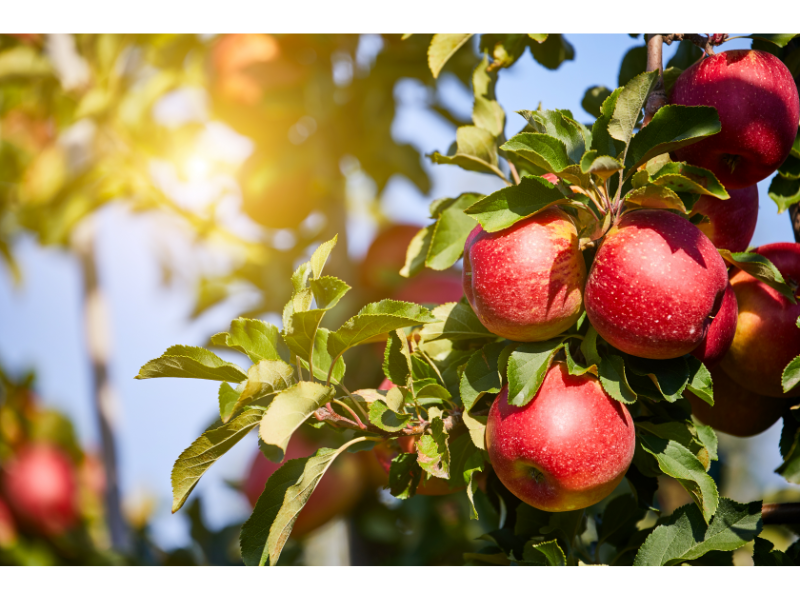
Apples are not only delicious but also a great choice for those looking to lose weight. These fruits are low in calories, making them an ideal snack option for individuals watching their calorie intake. Additionally, apples are high in fiber, which helps promote feelings of fullness and aids in digestion.
With an average apple containing around 95 calories and about 4 grams of fiber, they provide a satisfying snack that can help curb hunger cravings without sabotaging weight loss efforts. The high fiber content also slows down digestion and keeps blood sugar levels stable, preventing sudden spikes and crashes that can lead to overeating.
Furthermore, apples have a high water content, contributing to their overall satiety factor. Staying hydrated is crucial for weight loss as it can help control appetite and prevent unnecessary snacking. Apples can be an excellent hydrating snack option on top of being low in calories and packed with fiber.
Incorporating apples into a balanced diet can offer numerous health benefits beyond weight management. They contain essential vitamins such as vitamin C and potassium while being naturally sweet without any added sugars or fat.
If you’re looking for a tasty yet nutritious snack that supports your weight loss goals, reach for an apple. With their low calorie count, high fiber content, hydration benefits, and array of vital nutrients, apples make the perfect addition to any healthy eating plan.
Berries: Berries such as strawberries, blueberries, and raspberries are packed with antioxidants and fiber while being low in calories
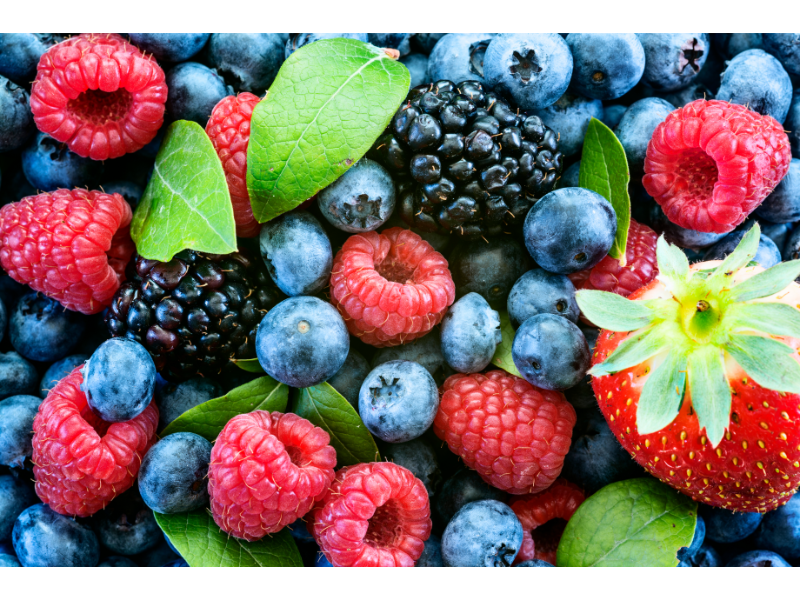
Berries, such as strawberries, blueberries, and raspberries, have long been celebrated for their nutritional benefits. These small fruits are not only deliciously sweet but also incredibly nutritious. Packed with antioxidants and fiber, berries make an excellent addition to a healthy diet.
One of the key advantages of berries is their high antioxidant content. Antioxidants help protect our cells from damage caused by harmful molecules called free radicals. Berries are particularly rich in anthocyanins, a type of antioxidant that gives them their vibrant colors. These compounds have been linked to various health benefits, including reducing inflammation and lowering the risk of chronic diseases such as heart disease and certain types of cancer.
In addition to antioxidants, berries are also an excellent source of dietary fiber. Fiber is essential for maintaining a healthy digestive system and promoting regular bowel movements. It can also help control blood sugar levels and contribute to weight management by providing a feeling of fullness.
What makes berries even more appealing is their low calorie content. They offer a naturally sweet taste without adding excessive calories to your diet. This makes them a great choice for those who are watching their weight or trying to maintain a balanced eating plan.
To reap the maximum benefits from berries, it’s important to choose fresh or frozen varieties over processed or sugary options like jams or jellies. Incorporating these nutrient-packed fruits into your diet can be as simple as adding them to your morning cereal or yogurt, blending them into smoothies, or enjoying them on their own as a healthy snack.
A Berries such as strawberries, blueberries, and raspberries offer an impressive nutritional profile. They are loaded with antioxidants that protect our cells from damage while providing valuable fiber for digestive health. With their low calorie content and delicious taste, incorporating these vibrant fruits into your diet is an easy way to support overall wellness while satisfying your sweet tooth in a healthy way
Grapefruit: Grapefruit is known for its metabolism-boosting properties and its ability to help control appetite
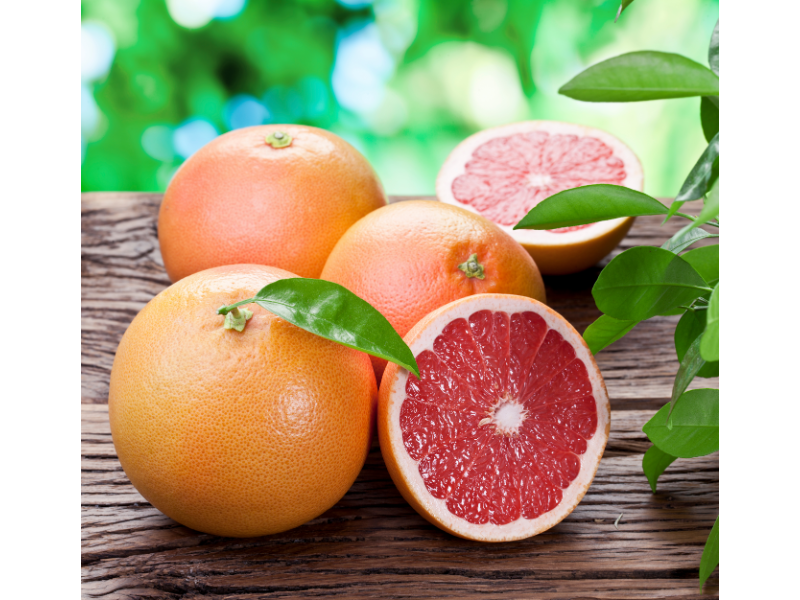
Grapefruit is a citrus fruit renowned for its numerous health benefits, particularly its metabolism-boosting properties and its potential to aid in appetite control. Packed with essential nutrients, including vitamins A and C, as well as dietary fiber, grapefruit can be a valuable addition to a balanced diet.
One notable attribute of grapefruit is its ability to enhance metabolism. Research suggests that consuming grapefruit or its juice may increase metabolic rate due to the presence of certain compounds that stimulate the production of enzymes responsible for fat oxidation. This means that incorporating grapefruit into your diet may potentially help you burn calories more efficiently.
Additionally, grapefruit has been associated with appetite control. The fruit’s high fiber content can promote feelings of fullness and reduce hunger cravings. Studies have shown that consuming half a grapefruit before meals can lead to reduced calorie intake, making it an appealing option for those aiming to manage their weight.
Furthermore, grapefruit is packed with antioxidants that contribute to overall health and well-being. These antioxidants protect the body against damage caused by harmful free radicals, potentially reducing the risk of chronic diseases such as heart disease and certain types of cancers.
It’s important to note that while grapefruit offers various health benefits, it should not be considered a magic solution for weight loss or appetite control alone. It is always recommended to maintain a balanced diet and consult with a healthcare professional before making any significant changes in your eating habits.
The grapefruit’s metabolism-boosting properties and potential impact on appetite control make it an intriguing fruit worth considering adding to your diet. However, like any dietary change or supplement, it should be approached as part of an overall healthy lifestyle plan.
Avocado: Although technically a fruit, avocados are rich in healthy fats that can keep you feeling full for longer periods
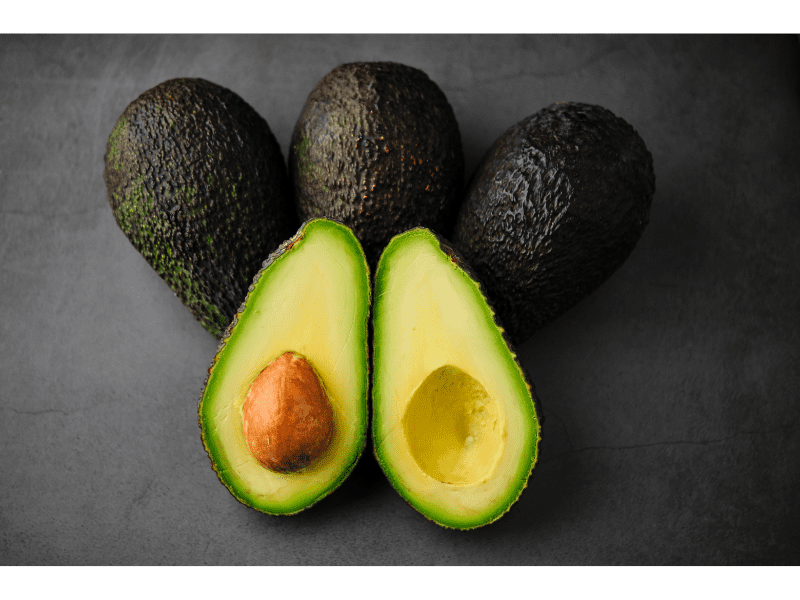
Avocados, often mistaken for a vegetable, are actually classified as a fruit due to their seed-bearing nature. However, what sets avocados apart from other fruits is their high content of healthy fats. These nutritious fats not only contribute to the creamy texture and rich flavor of avocados but also offer numerous health benefits.
Avocados are primarily composed of monounsaturated fats, which are considered heart-healthy. These fats can help lower bad cholesterol levels and reduce the risk of heart disease. Additionally, they provide a feeling of satiety and can keep you feeling full for longer periods.
Apart from being a great source of healthy fats, avocados also contain an array of essential vitamins and minerals. They are particularly rich in potassium, vitamin K, vitamin E, vitamin C, and several B vitamins. Potassium plays a vital role in maintaining proper heart function and regulating blood pressure levels.
Moreover, avocados are packed with dietary fiber that aids digestion and promotes bowel regularity. This fiber content helps prevent spikes in blood sugar levels by slowing down the absorption of carbohydrates from other foods consumed alongside them.
Including avocados in your diet can be a smart choice for those looking to incorporate more nutrient-dense foods into their meals. Whether enjoyed on toast or added to salads, guacamole or smoothies, this versatile fruit offers both taste and health benefits that make it an excellent addition to any well-balanced diet.
Watermelon: With its high water content and low calorie count, watermelon is an excellent choice for weight loss
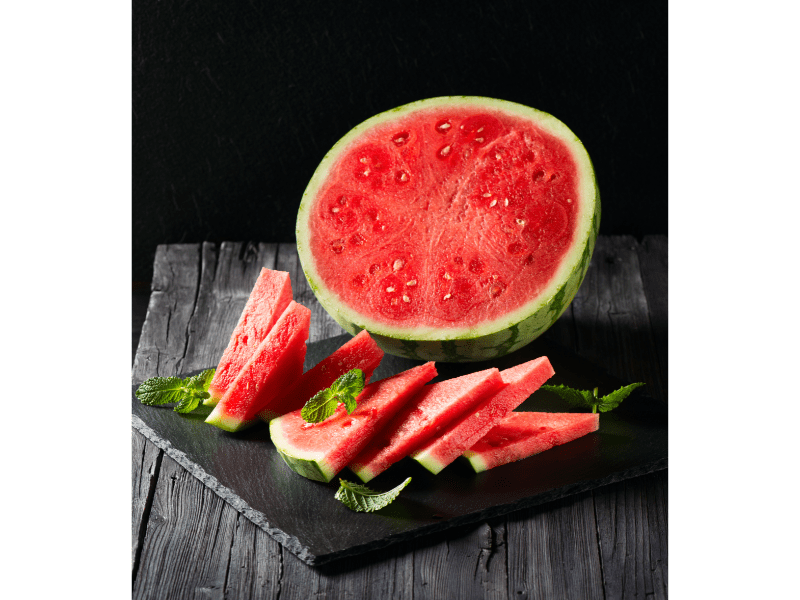
When it comes to weight loss, finding foods that are both refreshing and low in calories can be a challenge. However, watermelon stands out as an excellent choice. With its high water content and relatively low calorie count, this juicy fruit is not only delicious but also a great addition to any weight loss diet.
Watermelon is composed of about 92% water, making it incredibly hydrating. Staying hydrated is essential for overall health and can also aid in weight loss by keeping you feeling full and satisfied. Moreover, the high water content in watermelon contributes to its low energy density, which means you can consume a larger portion without consuming too many calories.
In addition to being hydrating and low in calories, watermelon offers various other health benefits. It is rich in vitamins A and C, which are both important for maintaining a healthy immune system. It also contains lycopene, an antioxidant that has been linked to reducing the risk of certain cancers and promoting heart health.
When incorporating watermelon into your weight loss journey, it’s important to keep portion sizes in mind. While it may be tempting to indulge in large quantities due to its refreshing taste, moderation is key. Pairing watermelon with other nutrient-dense foods like lean proteins or whole grains can help create a balanced meal that supports your weight loss goals.
Overall, with its high water content, low calorie count, and various nutritional benefits, watermelon proves to be an excellent choice for those seeking weight loss while still enjoying delicious food options. So next time you’re looking for a guilt-free snack or dessert option during your weight loss journey, consider reaching for some refreshing slices of juicy watermelon!
Pineapple: Pineapple contains an enzyme called bromelain which aids digestion and helps reduce bloating
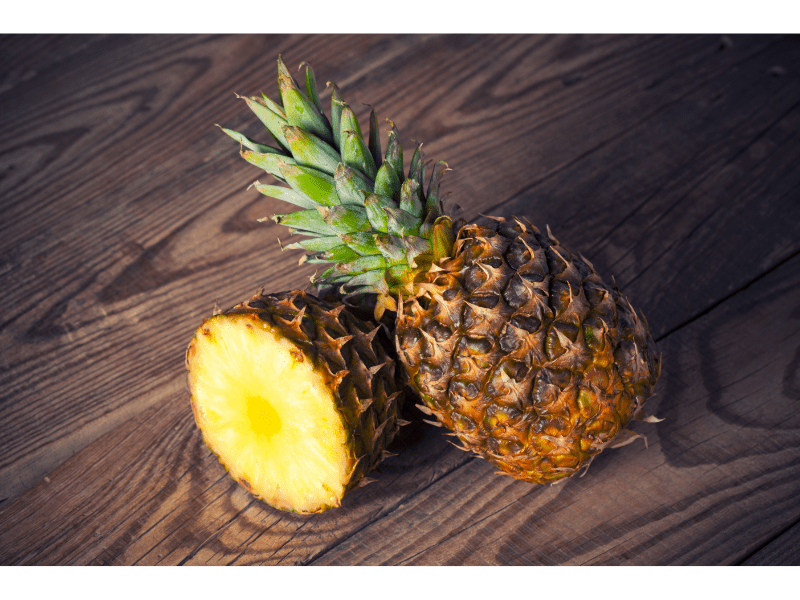
Pineapple, a tropical fruit known for its sweet and tangy taste, offers more than just a delicious flavor. One of the key components that makes pineapple unique is an enzyme called bromelain. This enzyme is found abundantly in the fruit and has gained attention for its potential health benefits.
One notable advantage of bromelain is its ability to aid digestion. This enzyme has been shown to break down proteins, facilitating the digestion process and allowing for better nutrient absorption. By supporting the breakdown of proteins, bromelain can help alleviate digestive discomforts such as bloating and indigestion.
Additionally, bromelain has been recognized for its potential anti-inflammatory properties. Studies have suggested that this enzyme may help reduce inflammation in the body by inhibiting certain compounds involved in the inflammatory response. As a result, consuming pineapple or bromelain supplements may potentially offer relief from conditions characterized by inflammation.
It’s important to note that while pineapple contains bromelain, the concentration of this enzyme can vary depending on factors such as fruit ripeness and processing methods. Therefore, if you’re specifically seeking out pineapple for its digestive benefits or anti-inflammatory properties, it may be advisable to consult with a healthcare professional or consider bromelain supplements that provide standardized amounts of this enzyme.
The pineapple’s inclusion of bromelain sets it apart from other fruits and offers potential health advantages. From aiding digestion to potentially reducing inflammation in the body, incorporating pineapple into your diet may contribute positively to your overall well-being.
Oranges: Oranges are not only refreshing but also rich in vitamin C and fiber, promoting satiety

Oranges, known for their vibrant color and refreshing taste, offer more than just a delightful eating experience. Packed with essential nutrients, oranges are a great addition to any diet. Notably, they are an excellent source of vitamin C, a nutrient that plays a crucial role in supporting the immune system and promoting overall health. Additionally, oranges are rich in fiber, which aids in digestion and promotes feelings of satiety. Whether enjoyed as a snack or incorporated into various dishes and beverages, oranges provide numerous health benefits that make them an excellent choice for those seeking optimal nutrition.
Pears: Pears are high in fiber and have a satisfying crunch that can help curb cravings
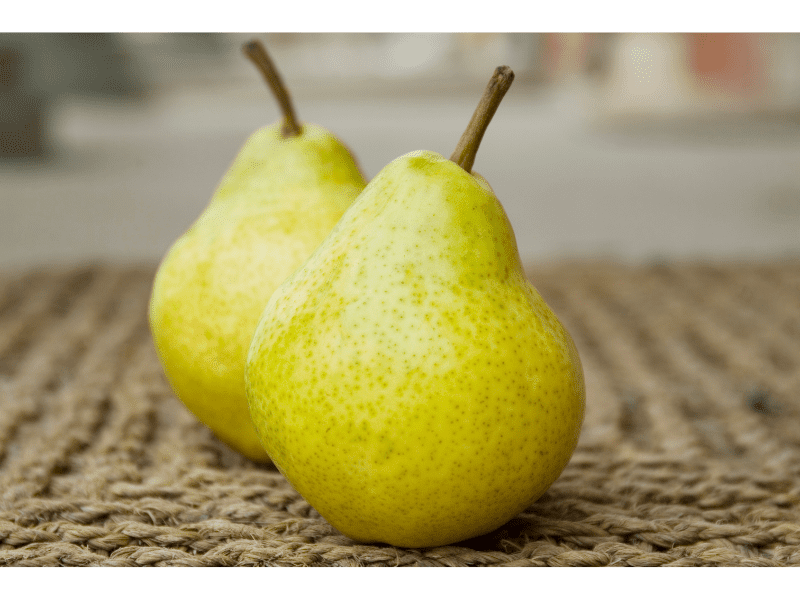
Pears are not only delicious but also packed with nutritional benefits. One of the standout features of pears is their high fiber content. Fiber plays a crucial role in maintaining a healthy digestive system and can help prevent constipation. Additionally, the fiber in pears can promote feelings of fullness, making them a great snack for those trying to manage their weight or curb cravings.
Another appealing aspect of pears is their satisfying crunch. When biting into a juicy pear, you not only experience a burst of sweet flavor but also enjoy the refreshing texture that can be incredibly satisfying. This combination of taste and crunch can be particularly helpful when trying to resist unhealthy snacking or satisfy the desire for something crunchy.
Furthermore, pears are low in calories and fat while being rich in essential nutrients such as vitamin C, potassium, and antioxidants. Vitamin C is known for its immune-boosting properties, while potassium helps support heart health.
Incorporating pears into your diet can be as easy as enjoying them on their own as a snack or adding them to salads, oatmeal, or smoothies for an extra nutritional boost. With their high fiber content and satisfying crunch, pears make an excellent choice for anyone looking to enhance their overall well-being while curbing cravings in a healthy way.
Papaya: Papaya is loaded with digestive enzymes that can support healthy digestion while being low in calories
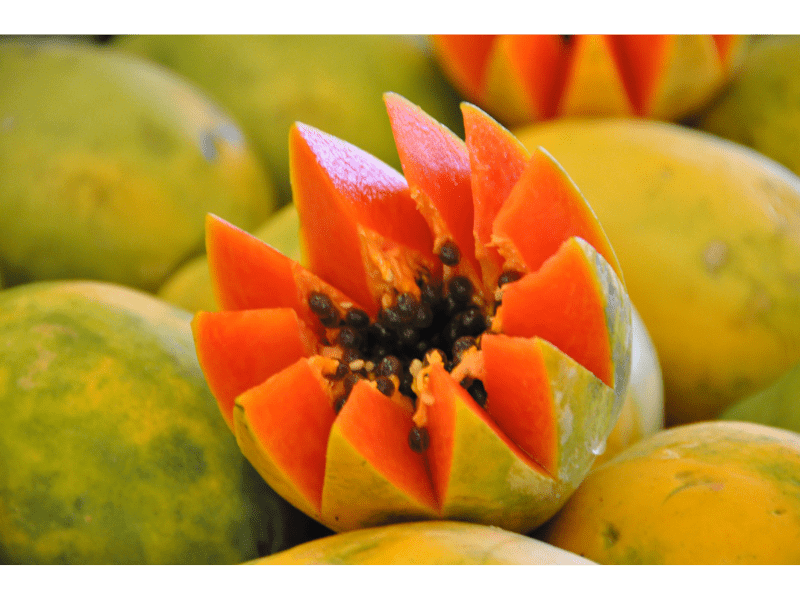
Papaya, a tropical fruit cherished for its vibrant color and juicy sweetness, offers more than just a delightful flavor. It is also packed with digestive enzymes that can provide numerous benefits for our digestive health. These enzymes, such as papain and chymopapain, help break down proteins and aid in the digestion of food.
One of the key advantages of consuming papaya is its ability to support healthy digestion. The enzymes present in papaya assist in breaking down complex proteins into simpler forms, making it easier for our bodies to absorb nutrients. As a result, this tropical fruit can relieve symptoms like bloating, gas, and indigestion.
Additionally, papaya is considered a low-calorie fruit, making it an excellent choice for those who are conscious about their calorie intake. With only 43 calories per 100 grams, it can be enjoyed guilt-free while providing essential vitamins and minerals.
Furthermore, papaya contains dietary fiber which aids in maintaining regular bowel movements and prevents constipation. This fiber content promotes overall gut health by nourishing the beneficial bacteria in our intestines.
Incorporating papaya into your diet can be as simple as enjoying it fresh or adding it to smoothies or salads. It’s important to note that while papaya offers many health benefits related to digestion and weight management, individual results may vary. As with any dietary changes or concerns about existing health conditions, consulting with a healthcare professional is always recommended.
The consumption of papaya can be an excellent choice for those seeking digestive support due to its rich content of digestive enzymes. Additionally, its low-calorie nature makes it a favorable option for individuals aiming to maintain a balanced diet while enjoying a delicious tropical fruit.
Guava: Guava is rich in fiber and low in calories, making it an ideal choice for weight loss
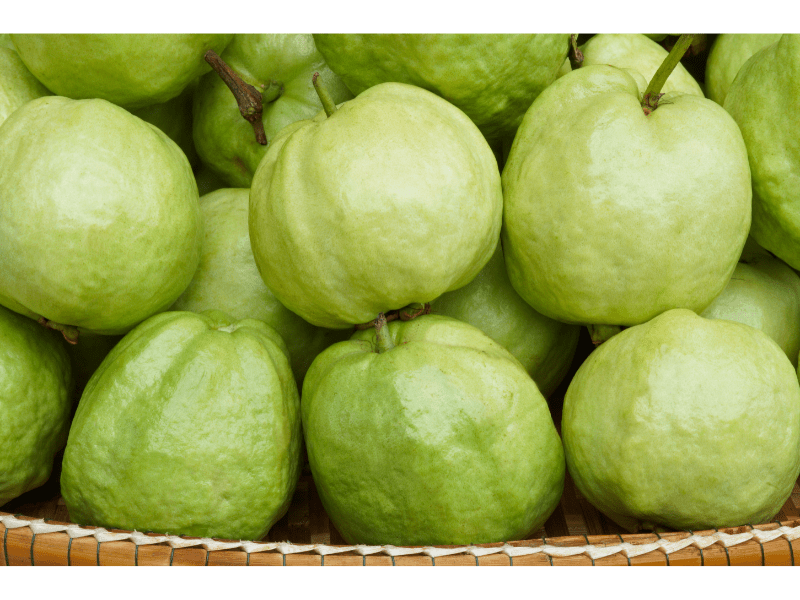
Guava, a tropical fruit known for its sweet and tangy flavor, is not only delicious but also offers numerous health benefits. One of its standout qualities is its potential to aid in weight loss. Guava is an ideal choice for those looking to shed a few pounds due to its rich fiber content and low calorie count.
Fiber plays a crucial role in weight management as it helps promote feelings of fullness and reduces overeating. Guava is packed with dietary fiber, with just one cup providing about 9 grams of this essential nutrient. Consuming foods high in fiber can help control appetite, prevent unnecessary snacking, and ultimately contribute to maintaining a healthy weight.
Furthermore, guava’s low calorie content makes it an excellent addition to any weight loss diet. With only around 68 calories per cup, guava provides a satisfyingly sweet treat without adding excessive calories to your daily intake. This allows you to enjoy the fruit guilt-free while still staying on track with your weight loss goals.
In addition to being fiber-rich and low in calories, guava also offers other nutritional benefits that support overall health during the weight loss journey. It is an excellent source of vitamins A and C, both of which play vital roles in boosting immunity and promoting healthy skin. Moreover, guava contains beneficial antioxidants that help protect the body against oxidative stress caused by free radicals.
To incorporate guava into your weight loss plan, consider enjoying it as a snack or adding it to salads or smoothies for an extra burst of flavor and nutrition. Remember that while guava can be beneficial for weight management when consumed as part of a balanced diet, it should be combined with regular exercise and other healthy lifestyle habits for optimal results.
The guava’s high fiber content and low calorie count make it an ideal choice for individuals seeking to lose weight. By incorporating this tropical fruit into your diet along with other healthy choices, you can enjoy its delicious taste while supporting your weight loss journey and overall well-being.
Kiwi: Kiwi is a nutrient-dense fruit that is low in calories but high in vitamins A, C, E, and K
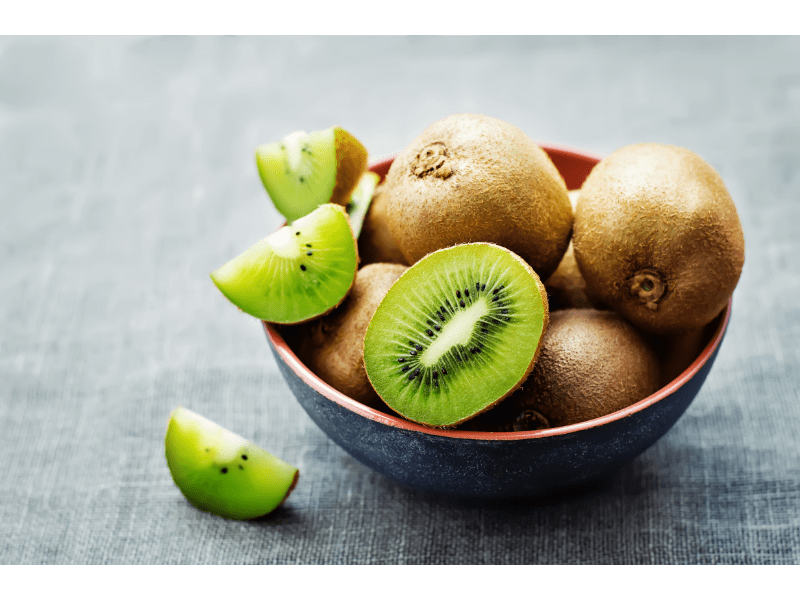
Kiwi, scientifically known as Actinidia deliciosa, is a small fruit that packs a powerful nutritional punch. It is native to China but is now cultivated in various parts of the world due to its popularity and numerous health benefits.
One of the key reasons why kiwi stands out from other fruits is its impressive nutrient density. Despite being low in calories, kiwi is rich in essential vitamins and minerals. It contains high levels of vitamins A, C, E, and K, making it an excellent addition to a healthy diet.
Vitamin C is one of the standout nutrients found in kiwi. In fact, just one medium-sized kiwi can provide more than 100% of the recommended daily intake of vitamin C for an adult. This antioxidant vitamin plays a crucial role in supporting immune function and protecting against oxidative stress.
Additionally, kiwi contains significant amounts of vitamins A and E. Vitamin A contributes to good vision health and helps maintain healthy skin and mucous membranes. Vitamin E acts as an antioxidant that protects cells from damage caused by free radicals.
Furthermore, kiwi offers a good amount of vitamin K which plays a vital role in blood clotting and bone health. Adequate intake of this vitamin ensures proper blood coagulation and supports bone mineralization.
Apart from being rich in vitamins, kiwis are also packed with dietary fiber which aids digestion and promotes satiety. They are also a good source of potassium which helps regulate blood pressure levels.
Incorporating nutrient-dense fruits like kiwi into your diet can be highly beneficial for overall health due to their impressive vitamin content. Whether enjoyed on its own or added to smoothies or salads, this small fruit has much to offer in terms of nutrition while being low in calories.
Cherries: Cherries are not only delicious but also have anti-inflammatory properties that may aid weight loss efforts
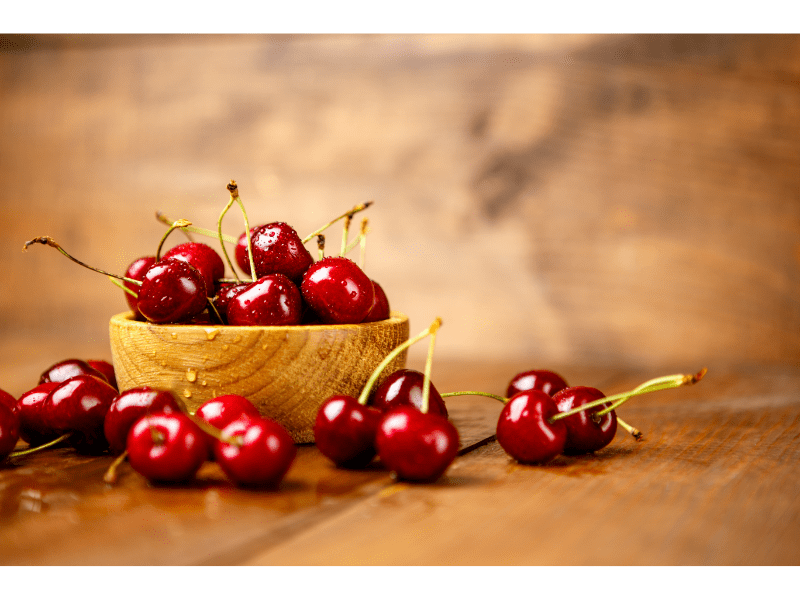
Cherries are not just a tasty treat; they also offer numerous health benefits. One notable benefit is their anti-inflammatory properties, which can potentially aid in weight loss efforts. These vibrant fruits are packed with antioxidants and phytochemicals that help fight inflammation in the body. Inflammation has been linked to weight gain and obesity, so incorporating cherries into your diet may be beneficial for those looking to shed some pounds. Additionally, cherries have a low calorie and high fiber content, making them a satisfying snack choice for those watching their weight. So next time you’re craving something sweet, consider reaching for some cherries to not only satisfy your taste buds but also support your weight loss goals.
Mangoes: While mangoes are higher in sugar than some other fruits, they are also packed with vitamins and antioxidants
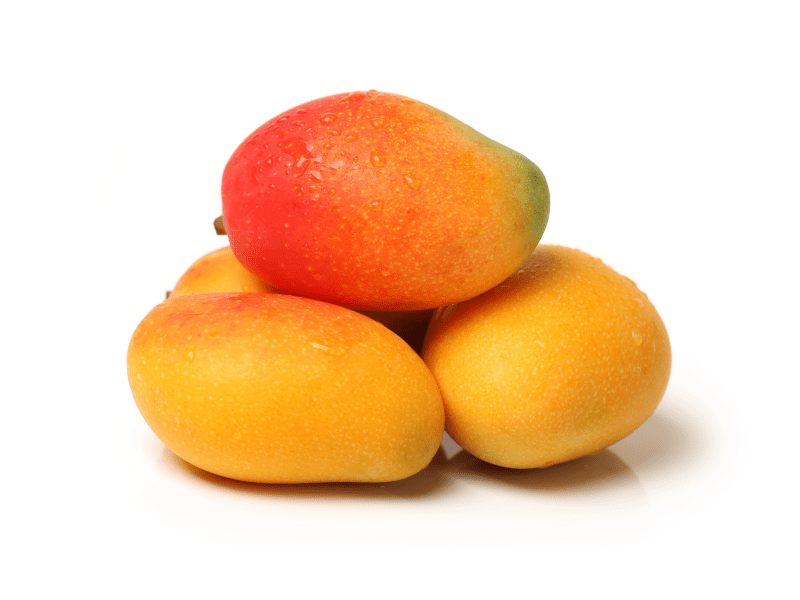
Mangoes, often referred to as the “king of fruits,” are not only delicious but also offer numerous health benefits. While it is true that mangoes are relatively higher in sugar compared to certain other fruits, they are also packed with essential vitamins and antioxidants that make them a valuable addition to a balanced diet.
One of the primary reasons mangoes are celebrated is their impressive nutrient profile. They are an excellent source of vitamin C, providing nearly 100% of the recommended daily intake in just one cup. Vitamin C plays a crucial role in supporting immune function and promoting collagen production for healthy skin.
Additionally, mangoes contain vitamin A, which is essential for maintaining good vision and promoting healthy skin and mucous membranes. This tropical fruit also offers a good amount of folate, an important nutrient for cell growth and development, especially during pregnancy.
In addition to vitamins, mangoes are rich in antioxidants such as beta-carotene and polyphenols. These compounds help protect the body against oxidative stress caused by harmful free radicals. Antioxidants have been linked to reducing the risk of chronic diseases such as heart disease and certain types of cancer.
Despite their natural sweetness, it’s worth noting that enjoying mangoes in moderation can be part of a healthy diet. Their high fiber content helps slow down the absorption of sugars into the bloodstream, preventing spikes in blood sugar levels.
To fully reap the benefits of mangoes while managing sugar intake, portion control is key. Incorporating them into a well-balanced meal plan alongside other fruits, vegetables, whole grains, lean proteins, and healthy fats ensures a diverse range of nutrients without excessive sugar consumption.
While mangoes may be higher in sugar compared to some other fruits, they offer an array of essential vitamins and powerful antioxidants that contribute to overall health and well-being. Enjoying them as part of a varied diet supports optimal nutrition while savoring their delectable flavor.
Peaches: Peaches are not only sweet but also contain vitamins A and C while being relatively low in calories
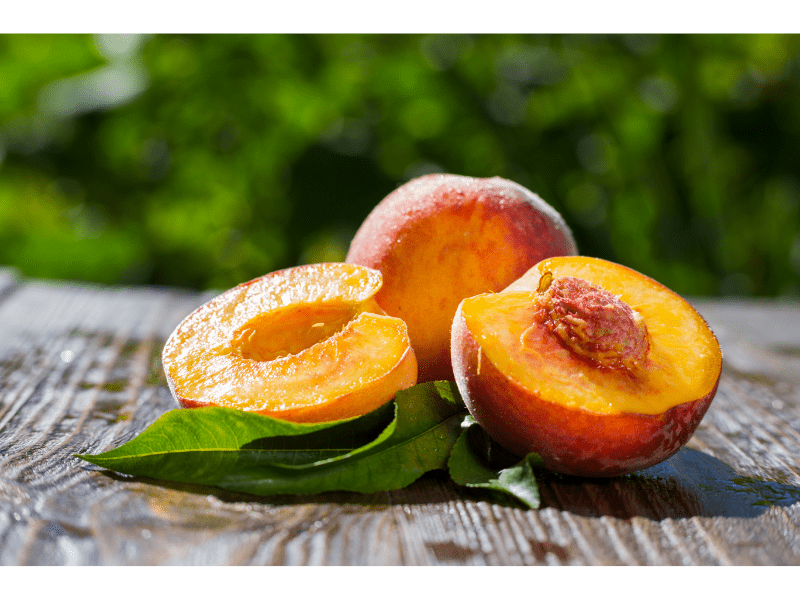
Peaches are a delicious and nutritious fruit that offer more than just their sweet taste. Packed with essential vitamins and relatively low in calories, peaches make for a healthy addition to any diet. Not only do they provide a satisfying snack option, but they also offer important nutrients such as vitamins A and C.
Vitamin A is known for its role in maintaining healthy vision, supporting immune function, and promoting the growth and development of cells and tissues throughout the body. Peaches are considered a good source of this vitamin, making them an excellent choice for those looking to boost their eye health and overall immune system.
Additionally, peaches are rich in vitamin C, which is well-known for its antioxidant properties. This vitamin plays a crucial role in supporting the immune system by helping to protect cells from damage caused by harmful free radicals. It also aids in collagen production, which is essential for maintaining healthy skin, bones, and blood vessels.
What makes peaches even more appealing is their relatively low calorie content. With approximately 60-70 calories per medium-sized peach, they can be enjoyed guilt-free as part of a balanced diet or weight management plan.
The peaches offer not only a delightful sweetness but also valuable nutrients like vitamins A and C. Their low calorie count makes them an ideal choice for those seeking both taste and nutrition in their daily meals or snacks.
Plums: Plums contain dietary fiber along with vitamins A and C which can contribute to healthy weight management
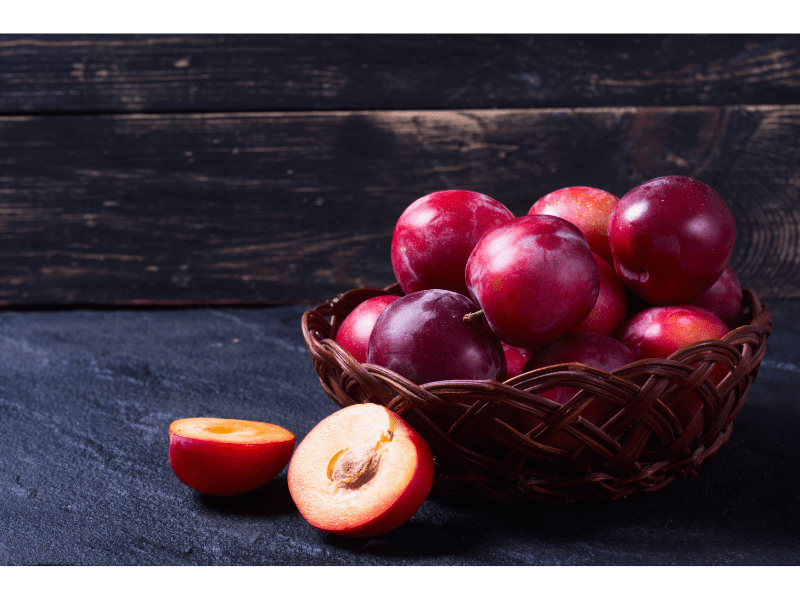
Plums, a delicious and nutritious fruit, offer a range of health benefits that contribute to healthy weight management. Packed with dietary fiber, plums can aid in digestion and promote a feeling of fullness, helping to control appetite and prevent overeating. Additionally, plums are a great source of vitamins A and C, which play vital roles in maintaining overall health.
Dietary fiber is an essential component for maintaining a healthy weight. It adds bulk to the diet, making us feel fuller for longer periods of time. By incorporating plums into your diet, you can increase your fiber intake and support healthy weight management goals.
Furthermore, plums are rich in vitamins A and C. Vitamin A is known for its role in promoting healthy vision and supporting immune function. It also plays a part in skin health. On the other hand, vitamin C is an important antioxidant that aids in collagen production, boosting skin health and promoting wound healing.
Incorporating plums into your daily diet can be as simple as enjoying them as a snack or adding them to salads or smoothies. With their natural sweetness and juiciness, they make for a delicious addition to any meal or snack.
The plums are not only tasty but also offer various health benefits that contribute to healthy weight management. With their high fiber content and abundance of vitamins A and C, they can be an excellent addition to any balanced diet aimed at maintaining or achieving a healthy weight.
Cranberries: Cranberries are rich in antioxidants and have been associated with improved digestion and weight management
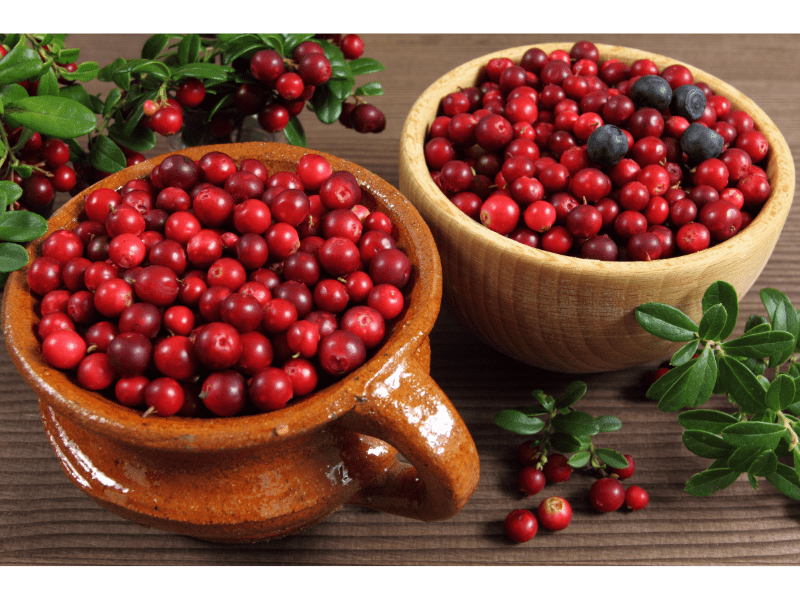
Cranberries are small, vibrant red berries that pack a powerful nutritional punch. Not only are they bursting with flavor, but they also boast an impressive array of health benefits. One of the key reasons why cranberries have gained popularity is their high antioxidant content. Antioxidants help protect our cells from damage caused by harmful free radicals, reducing the risk of chronic diseases such as heart disease and certain types of cancer.
In addition to their antioxidant properties, cranberries have been associated with improved digestion. They contain natural compounds called proanthocyanidins that can help prevent certain types of bacteria from adhering to the walls of the digestive tract. This action may reduce the risk of urinary tract infections and promote a healthy gut.
Furthermore, cranberries have been linked to weight management. These berries are low in calories and high in fiber, making them a satisfying snack choice for those looking to shed some pounds. The fiber content in cranberries can help regulate blood sugar levels and promote feelings of fullness, potentially curbing overeating.
It’s important to note that while cranberries offer numerous health benefits, it’s best to consume them in moderation as part of a balanced diet. Incorporating cranberries into your meals or enjoying them as a snack can be a delicious way to support your overall well-being and enjoy their unique flavor profile.
Incorporating these weight loss-friendly fruits into your diet can provide you with essential nutrients while helping you achieve your weight loss goals. Remember to enjoy them as part of a balanced diet along with regular exercise for optimal results.
Apricots: Nutrient-Dense and Weight-Friendly

Apricots are a fantastic choice for those looking to eat healthily and manage their weight. Packed with essential nutrients like vitamins A and C, apricots offer a sweet and satisfying treat without weighing you down with calories. Their natural sweetness can also help curb sugar cravings, making them a delightful and weight-friendly snack option. Enjoying a handful of these juicy fruits not only nourishes your body but also supports your wellness journey in a deliciously simple way.
Lemons: Lemons are known for their detoxifying properties and can be a great addition to your weight loss routine
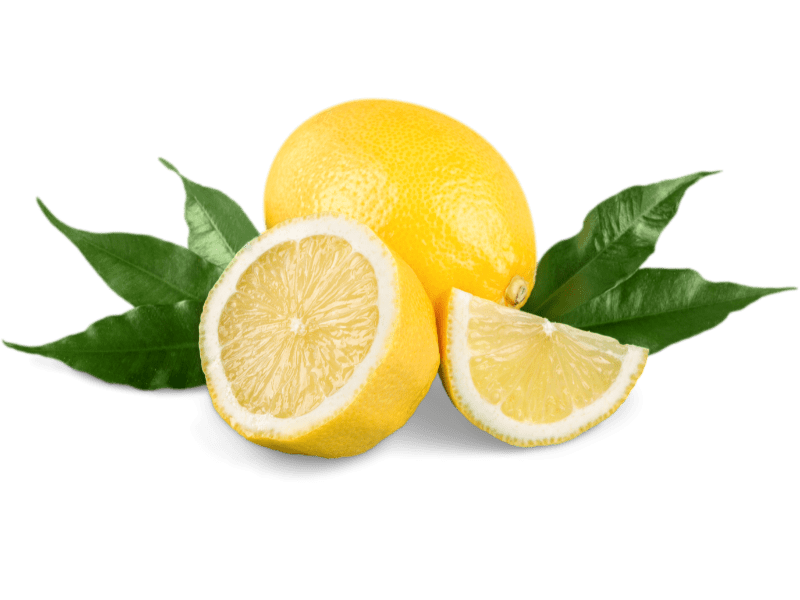
Lemons have long been recognized for their detoxifying properties and are often hailed as a beneficial addition to a weight loss routine. Packed with vitamin C, lemons can help boost the immune system and support overall health. Additionally, lemons are low in calories and can be used as a natural flavor enhancer in various dishes and beverages, making them a popular choice among those looking to shed pounds. Whether squeezed into water for a refreshing drink or used as a tangy dressing on salads, lemons offer a refreshing and nutritious way to support your weight loss goals.
Blackcurrants: The Nutrient Powerhouse
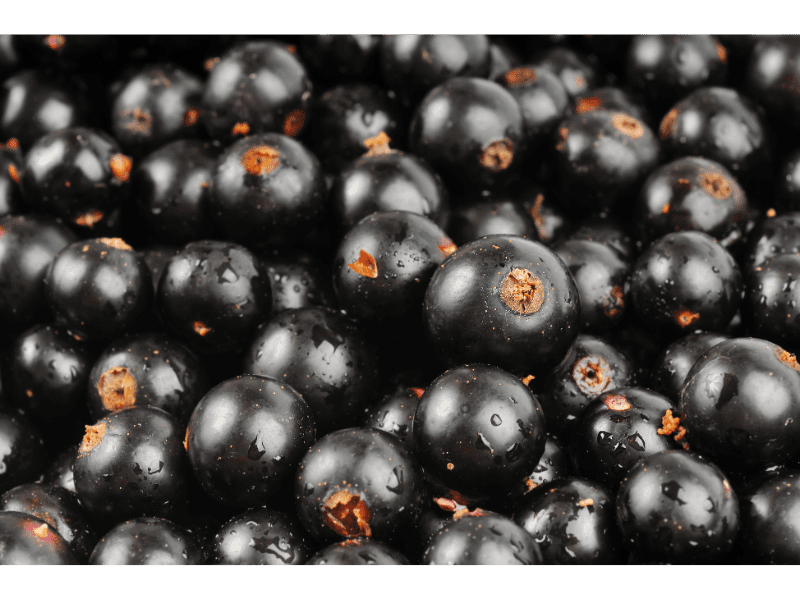
Blackcurrants are like tiny powerhouses when it comes to nutrition! These deep purple berries are bursting with vitamins, especially vitamin C, which is great for boosting your immune system. Additionally, they’re rich in antioxidants that help protect our cells from damage. Enjoying blackcurrants can be a tasty way to give your body a healthful dose of goodness. So, next time you spot these little gems, know that they’re doing wonders for your well-being in every bite!
How to Incorporate These Fruits into Your Diet for Maximum Weight Loss Results
Incorporating fruits into your diet can be a delicious and nutritious way to support your weight loss goals. Fruits are low in calories, high in fiber, and packed with essential vitamins and minerals. Whether you enjoy them as snacks, in smoothies, or as part of your meals, here are some tips on how to incorporate these fruits into your diet for maximum weight loss results.
- Include a variety of fruits: Aim to include a diverse range of fruits in your diet to benefit from different nutrients they offer. Apples, berries, citrus fruits, and tropical fruits like pineapple and mango are all excellent choices.
- Make fruit the star of your snacks: Instead of reaching for unhealthy processed snacks, opt for fresh fruit as a healthy alternative. Keep a bowl of washed and cut fruit on hand for easy snacking throughout the day.
- Get creative with fruit recipes: Explore different ways to incorporate fruits into your meals by trying out new recipes. Fruit salads, grilled fruit skewers, or even adding sliced fruit to savory dishes like salads can add flavor and nutrition.
- Enjoy fruit smoothies: Blend together a combination of your favorite fruits with some Greek yogurt or plant-based milk for a refreshing and filling snack or meal replacement option.
- Swap unhealthy desserts with healthy fruit alternatives: Instead of reaching for sugary desserts, satisfy your sweet tooth with natural sweetness from fresh fruits. Enjoy sliced melon or berries topped with Greek yogurt or indulge in homemade fruit sorbets made from frozen blended fruits.
Remember that while incorporating more fruits into your diet is beneficial for weight loss, it’s important to maintain an overall balanced and varied approach to nutrition. Consult with a healthcare professional or registered dietitian if you have any specific dietary concerns or restrictions before making significant changes to your diet plan.
Enjoying the Journey of Weight Loss with These Delicious Fruits
In conclusion, incorporating delicious fruits into your weight loss journey can be a game-changer. Not only are they low in calories and high in nutrients, but they also offer a wide range of flavors to satisfy your cravings. Whether you prefer the sweetness of berries, the tanginess of citrus fruits, or the refreshing crunch of apples and pears, there is a fruit out there for everyone.
By including fruits in your diet, you can enjoy guilt-free snacking while nourishing your body with essential vitamins, minerals, and fiber. These natural wonders not only promote weight loss but also support overall health and well-being.
Remember to choose a variety of fruits to ensure you get a diverse array of nutrients. Experiment with different recipes and combinations to keep things exciting on your weight loss journey. And most importantly, enjoy the process! Embrace the flavors and textures that nature has provided us with and savor every bite.
So go ahead and indulge in these delicious fruits as part of your weight loss plan. With their numerous health benefits and delightful taste profiles, they will not only help you shed those extra pounds but also make your journey towards a healthier lifestyle more enjoyable. Cheers to good health!.


4 thoughts on “19 Best Fruits for Weight Loss : The Power- Packed Delights”